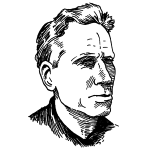THE SWERVE OF MOLECULES
Thomas McGuane’s recent book of stories, Gallatin Canyon (2006), compels a look back over nearly forty years of work. McGuane has steadily produced novels, stories and screenplays, and essays on sports and pastimes like fishing and horseback riding. He has been quietly influential and subtly subversive.[1] Coursing through his work is a current of strident silliness—funny names, wacky characters, outsize occurrences—that flows from Mark Twain, picks up Ring Lardner and others early in the twentieth century, and adds Joseph Heller and Thomas Pynchon, post–World War II.
In spite of this, McGuane is hard to place. The humor is evident from the start, but there is something stylishly askew. The early novels The Sporting Club (1969), The Bushwhacked Piano (1971), and Ninety-two in the Shade (1973), while full of oddballs in slapstick situations, also feature formalities of diction and syntactical quirks (“Stanton beckoned”; “Little comfort derived from the slumberous heat of the day”) that seem plucked from the Victorians. The Sporting Club’s protagonist even puts himself to sleep reading Thackeray. Complex intellectual formulations pop up, the following (from Ninety-two) occasioned by its narrator’s imagining his “aging lame” father in a whorehouse—horrible thought perhaps, though the narrator wonders if quiescence would be even worse: “A silent man wastes his own swerve of molecules; just as a bee ‘doing its number on the flower’ is as gone to history as if it never was. The thing and its expression are to be found shaking hands at precisely that point where Neverneverland and Illyria collide with the Book of Revelation under that downpour of grackle droppings that is the present at any given time.” One imagines young readers at that time (1973) pausing here to light up, musing, “Like, wow, man.” Early McGuane is full of such moments.
Still, McGuane’s work dodges the then-discernible categories. He was not part of the Barth/Barthelme/Hawkes wing of mytho-historical realism, though he seems to have been a fan, or at least a reader. Critic Dexter Westrum reports that a friend remembered young McGuane paying a quarter for a “first-edition hardcover of The End of the Road, John Barth’s scarcest title.” (Biographical information comes from Westrum’s useful introductory study Thomas McGuane unless otherwise noted.) And while Richard Brautigan (along with Carlos Castaneda and Baba Ram Dass) gets a mention in McGuane’s 1992 novel Nothing but Blue Skies, McGuane is never fixedly part of the hippie-lit set. Pynchon’s 1966 novel, The Crying of Lot 49, does seem to have some bearing on the case. Pynchon, like McGuane, goes readily to comic extremes,...
You have reached your article limit
Sign up for a digital subscription and continue reading all new issues, plus our entire archives, for just $1.50/month.
Already a subscriber? Sign in





